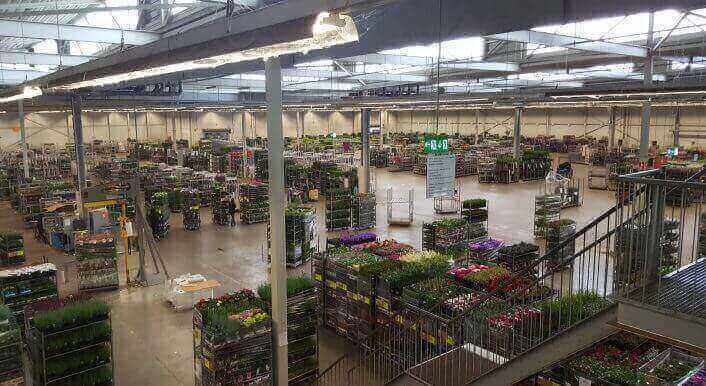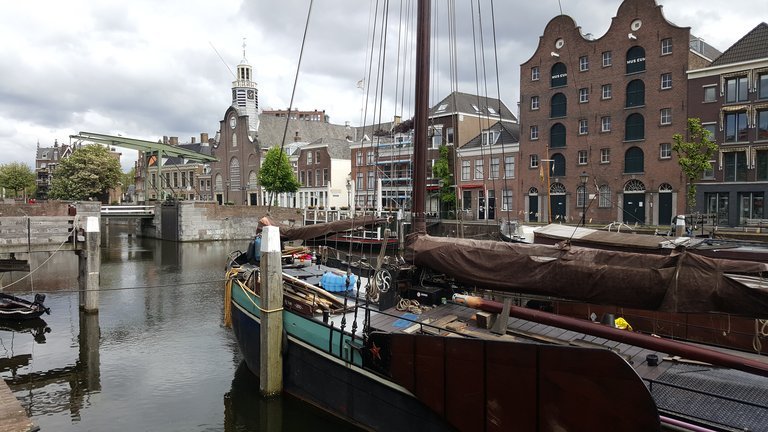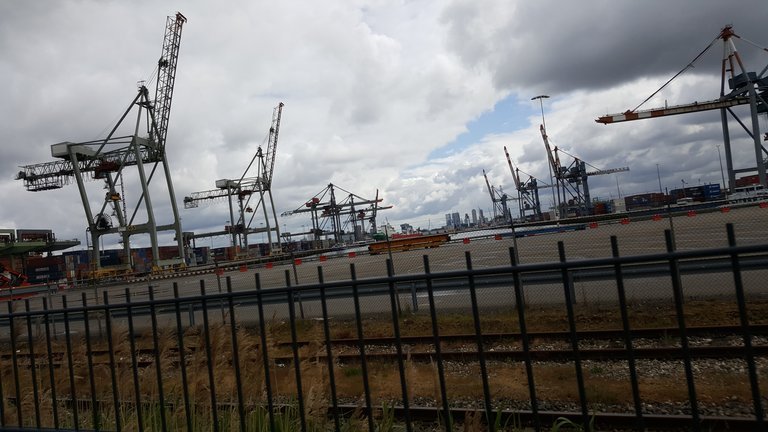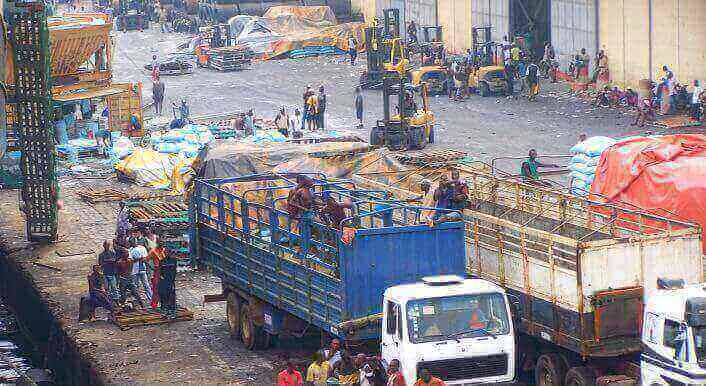The ‘ndrangheta’s Dutch flower power
In Italy’s deep South, one of the biggest mafia trials in Europe in recent years is about to come to an end. Members of the Crupi clan are accused of smuggling vast amounts of cocaine from South America to Italy, using the Netherlands as their main hub. The country’s ports but also its lax laws attract the ‘ndrangheta smugglers to the country in the heart of Europe. This investigation shows how they are trying to regroup in one of their preferred cover business, the import and export of flowers.

A version of this investigation has also been published in the Italian newspaper L’Espresso, the EU Observer and the Algemeen Dagblad from the Netherlands.
In the centre of The Hague, low-rise red brick buildings and trees line Loggerstraat, a welcoming street just a stroll away from the sea. A waiter in his fifties is relaxing outside an Italian restaurant, in front of him a Dutch newspaper.
His long-time boss is no ordinary restaurant owner. Rocco Gasperoni was a drug trader who had been trafficking drugs for numerous ‘ndrangheta families for at least two decades using the Netherlands as his operational base. Convicted in Italy in 2007, he continued to peacefully live in the Netherlands. Last May, our reporter decided to pay him a visit.
But on the morning of the planned visit, news broke that Gasperoni was arrested the day before, for a crime he committed almost two decades ago.
“I know Mr. Gasperoni, I’ve worked for him for many years“, the waiter says. Did he know that he was a powerful drug trader who had been sentenced to 14 years in jail in Italy while living in the Netherlands? „It’s all a misunderstanding, it’s not possible. Rocco can not be guilty of what they are saying.“
Everybody knows
To us, his answers sound a little bit too well-rehearsed, we don’t quite believe him. And that’s the relationship between the Netherlands – and similar countries in central Europe such as Germany – and the cocaine brokers in their midst: everybody knows they’re here, but nobody admits as much.
Italian investigators estimate that the ‘ndrangheta controls about 40 percent of global cocaine smuggling and that the group is Europe’s single biggest importer of cocaine. This also turns the ‘ndrangheta into an important player in the economies of Italy, Germany and other European countries where the group launders the ill-gotten gains.

The Netherlands, including the port city of Rotterdam, are one of the main gateways to Europe for the ‘ndrangheta’s cocaine trafficking.
Giulio Rubino
The Netherlands remains one of the main gateways to Europe for the ‘ndrangheta cocaine trafficking from South America, Italian prosecutors say. The country’s economy is geared towards international trade and boasts a modern infrastructure of ports and airports. Italian anti-mafia investigations have shown how the ‘ndrangheta has used the Netherlands for its cocaine trafficking since the ’80s. While the ‘ndrangheta thinks and operates globally, law enforcement struggles to cross borders and efforts by Dutch law enforcement at times appears lacklustre.
An arrest with 20 years of history
One of the pioneers’ to arrive in the Netherlands was Rocco Gasperoni, now aged 74. Others such as the Crupi family, an important mafia clan, followed in his footsteps, expanding the trade. When arrests are made, the smugglers quickly regroup with new front companies, blending into covers such as the famous Aalsmeer flower auction.
The history of Gasperoni’s arrest in The Hague in May last year stretches back 20 years, highlighting the extent to which European law enforcement is struggling to cope with organized crime syndicates. In 1997, Gasperoni was arrested in Malaga, Spain, on charges of international drug trafficking.
Gasperoni imported hashish as well as cocaine to Europe. He used several businesses to cover his tracks, including a wine import-export business. Before Gasperoni turned it into a restaurant, the spot in Den Haag’s Loggerstraat that our reporter visited used to be a wine shop of his.
An infamous town
Gasperoni worked closely with a ‘ndrangheta branch called the Siderno syndicate. Siderno is a small town at the toe of the Italian peninsula, in the region of Calabria. Calabria is the home of the ‘ndrangheta, while other mafia groups such as the Camorra operate from the area around Naples and the Cosa Nostra from Sicily.
So many ‘ndrangheta members come from Siderno, that an important sub group of the ‘ndrangheta has been named after the city: the Siderno group of crime. This group is particularly well-established in North America, but some of its members and associate brokers have also ventured elsewhere, such as Gasperoni.
Italian investigators found that Rocco Gasperoni transferred large sums from a Brussels bank account to members of the Siderno group, disguised as payments for the export of jeans. The Crupi mafia clan, some 50 members and associates of which are currently on trial at two courts in Italy, is also part of this group.
Three days in jail
In Spain, Gasperoni also bought cocaine from the ‘ndrangheta broker Nicola Assisi, one of the most powerful of those cocaine brokers to sell to the Siderno families, who is still at large in South America.
After his arrest in Spain in 1997, Gasperoni was extradited to Italy, but later freed while awaiting his trial. He immediately returned to his home in the Netherlands. It took the Italian court ten years to sentence Gasperoni to 14 years in jail. Police in Amsterdam arrested Gasperoni but he left jail after just three days thanks to what Dutch authorities say was a glitch in the paperworks sent by Italian police.
And Gasperoni continued his wine and textiles export businesses that Italian law enforcement says was a cover for the cocaine trading. Dutch police never investigated his commercial activities and it is not clear when exactly his criminal career ended.
Up until last spring when a court in Turin ruled that Gasperoni should be in jail. This time the bureaucracy between Italy and the Netherlands worked smooth, leading to his arrest the day before our reporters’ visit.
Uniquely, Italy has made it a criminal offense to be a member of a mafia clan, with sentences reaching up to more than 20 years in jail. That is one reason why mafia groups have moved some of their activities to countries such as the Netherlands, Germany and Switzerland where laws are lax and where the economy offers many opportunities to hide illicit activities and launder the proceeds.
While the mafiosi are easily taking advantage of global travel and trade infrastructure, prosecutors often enough struggle to follow their tracks across one single border, let alone around the globe. Even when arrests are made, the criminal networks are quickly able to regroup, as the recent case of the Crupi family, also from Siderno, shows.
A trip to Ecuador
On a day in June 2014, two men walked towards a car rental at the airport of Quito, the capital of Ecuador. Rattled after the long flight from Amsterdam, a row quickly flared up at the counter of the rental between Vincenzo Macrì and the car rental staff.
Macrì’s associates had pre-booked a Chevrolet Sail for him, a budget car made in China. Macrì and his colleague were going to cross the border into Colombia and they needed a car that would not attract police attention.
Macrì is the brother-in-law of Vincenzo Crupi, a key ‘ndrangheta operative, according to Italian prosecutors. Vincenzo Crupi grew up in Siderno, the small coastal town located deep in the South of Italy that lend its name to the Siderno group of crime.
In 2005, both men had set up a flower business in the Netherlands called Fresh BV. They immersed themselves in the famous Aalsmeer flower auction, one of the largest in the world, a sprawling complex of warehouses and office buildings the size of about 70 football fields. Flowers move in and out on trolleys 24 hours a day. With goods arriving from producer regions such as South America or the highlands of Ethiopia, traders at the warehouse handle both fresh flowers such as roses, flown into Europe by air cargo, as well as long durables house plants which tend to arrive by container ship. The plants are then shipped from here with thousands of trucks daily to flower wholesalers in Germany, Italy and elsewhere in Europe.
From here, the Crupi business sent trucks filled with flowers to Italy. But prosecutors in Italy allege that the flower business of Crupi and Macrì was a mere cover-up for the large scale import of cocaine, using the Aalsmeer flower auction as cover. So when members of the drug ring travelled to Latin America under the pretense of buying roses and leaf plants, prosecutors allege they were in fact buying cocaine.
A large network
From the Netherlands, the Crupi family, including Vincenzo Crupi’s two younger brothers, could count on a large network of transport companies, many of them operating out of the South of Italy, who were keen to move money or drugs hidden between their flower loads in exchange for fat pays. Police evidence shows how the trucks used by the criminal group usually transported only between six and eleven kilograms of cocaine in case of the police intercepted a shipment. But some shipments could reach up to 100 kilos, for which the smugglers allegedly paid 100,000 euro, according to communications intercepted by police and presented in evidence to a court in Rome.
“The ‘ndrangheta structures linked to Siderno are everywhere in the world, but they are mainly rooted in Canada and the Netherlands“, said Antonio de Bernardo, an anti-mafia prosecutor based in the southern Italian city of Reggio Calabria. De Bernardo helped to put the Crupi clan on trial. „We can say it was these structures to invent for the ‘ndrangheta the strategy to use the import-export of legal goods to cover cocaine traffic.“
In Southern Italy, the smugglers set up a sophisticated system of cash collection. Couriers all over the South of Italy collected the drug money and delivered it to the city of Latina, 60 kilometres south of Rome, where the Crupi family company had its headquarter. The money was then hidden between wooden pallets in the empty flower shops returning to the Netherlands, to re-inject the proceeds into the flower business. The Crupi entreprise included four secretaries who organised the flowers arrivals as well as the laundering of the drug proceeds.
All charges dropped
In September 2015, Vincenzo Crupi was arrested in Italy. More than 50 suspects, all Italian nationals, were arrested. Forty nine of them are currently on trial. The trial is among the most important in recent years in Italy and not only because of the sheer number of the accused. The trial targets the financial backbone of an ‘ndrangheta cartel with immense power in Italy and beyond, a power it has acquired thanks to its control over the cocaine trafficking.
The police investigation that led to the trial did not only target the cocaine operation in Italy but the entire value chain from the buying of drugs in South America to the distribution in Europe and to the laundering of the illicit proceeds. Further to the meetings of bosses who move tons of cocaine and millions of euros with a few cryptical words. The first verdict in the trial, which is not public, is expected for April. A lawyer for Vincenzo Crupi contacted by CORRECTIV declined to discuss the case.

The port of Rotterdam, alongside ports in Belgium and Germany, are used by the ‘ndrangheta to smuggle cocaine into Euro, Italien prosecutors say.
Giulio Rubino
The arrests were also one of the biggest hits against narcotics smuggling in the Netherlands to date. The Crupi trial shows that the ‘ndrangheta favors the country not only because of its central location and its logistics but also because of lax laws and lacklustre law enforcement. In the Netherlands, all charges against the defendants put on trial were dropped. Court records reviewed by CORRECTIV show that almost all the evidence on which prosecutors based their indictment was collected in Italy. There is, for example, nothing explaining how the drug traffickers actually moved the cocaine into the Netherlands. This also suggests that Dutch prosecutors were not keen to gain a wider picture of how the ‘ndrangheta is blending into the Dutch economy, famous for its low taxes, making it an underreported haven for offshore finance at the heart of northern Europe.
A complex knot
Dutch authorities argue they dropped charges against the defendants because in Italy defendants could be charged with being a member of the mafia, the most important tool law enforcement can muster in the fight against the mafia, and one that is only available in Italy. But lawyers to defendants told CORRECTIV that they are now using the fact that all charges, including other potential charges, were dropped in the Netherlands as one of their main lines of defense.
“After the results of the investigations were clear it was agreed upon that – because of the scale of the Italian investigation and the seriousness of the crimes committed on Italian soil and because almost all the suspects were arrested in Italy and are Italian citizens – prosecution would take place in Italy for membership of a criminal organization“, the Netherlands Justice Ministry said in a written statement. „Therefore charges were dropped in the Netherlands.“
The statement said that the Netherlands was no longer a safe-haven to the Italian mafia as cooperation with Italian prosecutors had intensified in recent years, including through posting a liaison officer in Italy in 2014. It said that at least seven Italian fugitives had been arrested in the Netherlands over the past year alone.
The statement also said that the arrest of Gasperoni, who is now serving his sentence in the Netherlands, was one of the fruits of the closer cooperation. “In this case a complex knot of Dutch, Italian and European law and practices had to be unraveled to be able to find a way to execute the Italian sentences“, the statement said.
Links are still maintained
In any case, Dutch prosecutors have their work cut out for them. With major logistics hubs such as Rotterdam port or Schiphol airport, the Netherlands is an important base for the ‘ndrangheta cocaine smuggling that it is unlikely to give up even when police do make arrests. Hints uncovered by this investigation show that the Crupi family hailing from the infamous ‘ndrangheta village Siderno still maintain their links to the flower business in the Netherlands.
A brother of Vincenzo Crupi was released on bail after his September 2015 arrest and shortly afterwards travelled to the offices of one of the Crupi flower companies in the Netherlands to get a hold of the company’s book keeping, according to the statement by another defendant seen by CORRECTIV.
Right before the arrests in the fall of 2015, Vincenzo’s brother married off his daughter to a young man from Siderno. The baroque villa close to Siderno at which the wedding took place was decorated with impressive walls of white roses.
A few months after the wedding and the arrests, the bridegroom opened a flower company in Siderno bearing a Dutch name, which according to its Facebook page also imports flowers from Aalsmeer.
The Crupi family’s latest florist told CORRECTIV he had no relationship with Crupi companies. He also claimed to have worked in the flower business prior to the arrests, dismissing the idea he had moved into the flower business after the arrests to ensure a continued Crupi presence in the business. But company records for the flower company he claimed to have worked for previously show that one of the owners is the son of a convicted mafia boss from the region while its managing director appears to live in Siderno in an area controlled by one of the mafia clans. On his Facebook page, however, the latter is in fact resident in the Netherlands and is active in the flower business.
This investigation is a cooperation between CORRECTIV and the Italian centre for investigative journalism IRPI, with the support of the Flanders Connect Continents Grant. Additional reporting by Claudio Cordova in Reggio Calabria, Koen Voskuil in Rotterdam.

